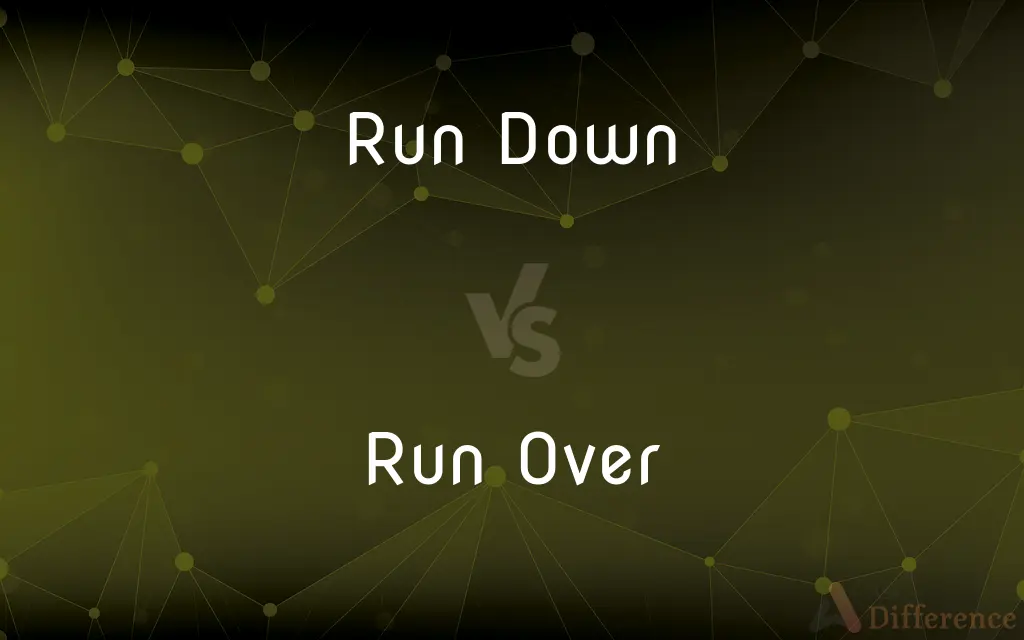Run Down vs. Run Over — What's the Difference?
Edited by Tayyaba Rehman — By Fiza Rafique — Published on December 24, 2023
"Run Down" means to become weaker or in disrepair, or to hit someone with a vehicle, while "Run Over" primarily means to drive over something or exceed a time limit.

Difference Between Run Down and Run Over
Table of Contents
ADVERTISEMENT
Key Differences
"Run Down" is a versatile phrase, embodying both a state of physical or mental decline and the act of a vehicle colliding with someone or something, resulting in the latter's fall. For instance, a building can be run down if not maintained, just as a person can feel run down after a long, tiring day. On the other hand, "Run Over" often conveys the act of a vehicle passing over an object or person, causing potential harm. A car might run over a toy left on the driveway.
Though both terms involve vehicular actions, Run Down carries a broader range of interpretations, while Run Over is more specific to the act of being driven over. To further complicate matters, Run Over can also mean exceeding a limit, especially in time. If a meeting is expected to end at 3 PM but goes beyond that, it has run over its allotted time.
Comparison Chart
Meaning in Context of Health
Refers to feeling tired or worn out.
Not typically used in a health context.
Meaning in Vehicular Context
Can mean a vehicle hitting someone, causing them to fall.
Means a vehicle passing over an object or person.
Usage in Time Context
Not typically used in relation to time.
Used to describe something exceeding its scheduled duration.
ADVERTISEMENT
Grammatical Use
Often used as an adjective (e.g., run-down house).
Often used as a verb (e.g., The car ran over the toy).
Synonyms
Dilapidated, tired, exhausted.
Exceed, surpass, overrun.
Compare with Definitions
Run Down
To hit or push someone or something with a vehicle, especially a car, causing them or it to fall or turn over.
He was run down by a speeding driver.
Run Over
To exceed an allotted span or limit, especially in time.
The meeting ran over by half an hour.
Run Down
To criticize someone, especially unfairly.
Don't run down your colleagues; it's unprofessional.
Run Over
To rehearse something quickly.
Let's run over the plan once more before we start.
Run Down
To become or make something become weaker or of poorer quality.
The building has really run down since no one lives there.
Run Over
To spill or overflow.
The bathtub ran over because I forgot to turn off the tap.
Run Down
To find someone after searching for a long time.
The detective finally ran down the suspect.
Run Over
To continue into another time or period.
The event ran over into the early hours of the morning.
Run Down
To lose power or stop operating.
My watch has run down; I need to wind it.
Run Over
To hit, drive, or pass over something.
I accidentally ran over my son's toy.
Run Down
(of a person) Tired and exhausted.
Run Down
(of a place) Decrepit.
Run Down
(of a clockwork mechanism) Having the spring unwound.
Run Down
Alternative form of run down
Run Down
Worn and broken down by hard use;
A creaky shack
A decrepit bus...its seats held together with friction tape
A flea-bitten sofa
A run-down neighborhood
A woebegone old shack
Run Down
Having the spring unwound;
A run-down watch
Common Curiosities
Can "Run Down" refer to someone's health?
Yes, someone can feel "run down" if they are tired or not feeling well.
Can buildings be described as "Run Down"?
Yes, a building can be described as "run down" if it's in poor condition.
Can "Run Over" imply overflowing?
Yes, like a filled container can "run over" if the content exceeds its capacity.
Is it grammatically correct to hyphenate "Run Down"?
When used as an adjective (e.g., a run-down house), it's hyphenated.
How can "Run Over" be used in rehearsal context?
It means to quickly review or rehearse, as in "run over the lines".
Can you "run down" information or details?
Yes, it means to search for or trace information.
Can "Run Over" mean to repeat?
In a way, yes, as in quickly reviewing or rehearsing something again.
If a show "runs over" its time, does it start late?
No, it means the show lasted longer than its scheduled duration.
Does "Run Over" always indicate a vehicular action?
No, it can also mean to exceed an allotted time or to review/rehearse something quickly.
What does it mean if a meeting "ran over"?
It means the meeting exceeded its scheduled end time.
Is "Run Down" always negative?
Most often it is, but in contexts like searching for information, it's neutral.
If someone is "run down" by a vehicle, does it always mean they're severely hurt?
Not always; it just means they were hit by the vehicle, but the severity can vary.
Can "Run Down" be used in the context of machinery?
Yes, machines can "run down" if they lose power or stop working.
Is "Run Over" used in the context of criticism like "Run Down"?
No, "run over" doesn't have a common usage related to criticism.
Does "Run Down" have a synonym in terms of deteriorating health?
Yes, terms like "exhausted" or "fatigued" can be synonymous.
Share Your Discovery

Previous Comparison
Tadpoles vs. Frogs
Next Comparison
Mouldy vs. MoldyAuthor Spotlight
Written by
Fiza RafiqueFiza Rafique is a skilled content writer at AskDifference.com, where she meticulously refines and enhances written pieces. Drawing from her vast editorial expertise, Fiza ensures clarity, accuracy, and precision in every article. Passionate about language, she continually seeks to elevate the quality of content for readers worldwide.
Edited by
Tayyaba RehmanTayyaba Rehman is a distinguished writer, currently serving as a primary contributor to askdifference.com. As a researcher in semantics and etymology, Tayyaba's passion for the complexity of languages and their distinctions has found a perfect home on the platform. Tayyaba delves into the intricacies of language, distinguishing between commonly confused words and phrases, thereby providing clarity for readers worldwide.












































